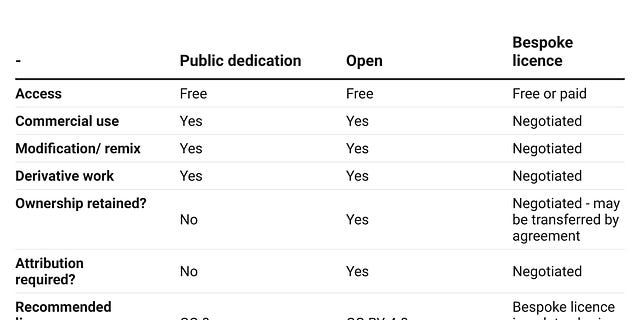What You Need to Know About Nature Data Licensing

Highlights
- In general, there are three main licensing approaches for publishing data with different benefits and considerations:
• Public dedication: data is dedicated to the global public domain with no restrictions;
• Open licence: highly permissive licence that allows unrestricted reuse but may include conditions such as a requirement to attribute the data holder; and
• Bespoke licence terms: named party-to-party relationship negotiated with flexible permitted uses and/ or restrictions, including commercial terms if relevant. (View Highlight)
 (View Highlight)
(View Highlight)- This field data serves multiple purposes: it provides evidence for forest carbon projects and can support data providers in training and validating their models. (View Highlight)
- Data sharing often requires formal agreements or licenses between data owners and users. These agreements help address key issues such as copyright, privacy, sovereignty, and ownership. (View Highlight)
- This is particularly crucial in situations with multiple stakeholders and sensitive information, such as protecting Indigenous Peoples’ traditional ecological knowledge through Biocultural Intellectual Property Rights (BCIPR) or obfuscating location data of endangered species. Standardised frameworks like Creative Commons licenses for open data sharing, the sample template in NDSI for open or commercial data sharing, and frameworks guiding best practices like GBIF’s on sensitive species occurrence data can be utilised to appropriately facilitate this exchange. (View Highlight)
- When corporate and commercial users, such as data analysts and sustainability managers, utilise nature data, additional considerations and safeguards are required. These users need clear terms that define how the data can be processed and analysed. It is also important to establish guidelines for how any derived insights can be shared.
End-user licensing agreements play a key role in addressing these requirements. These agreements should cover commercial usage rights, data attribution requirements, and potential revenue-sharing mechanisms. (View Highlight)

 (View Highlight)
(View Highlight)